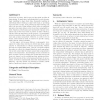Free Online Productivity Tools
i2Speak
i2Symbol
i2OCR
iTex2Img
iWeb2Print
iWeb2Shot
i2Type
iPdf2Split
iPdf2Merge
i2Bopomofo
i2Arabic
i2Style
i2Image
i2PDF
iLatex2Rtf
Sci2ools
109
click to vote
KDD
2005
ACM
2005
ACM
Anonymity-preserving data collection
Protection of privacy has become an important problem in data mining. In particular, individuals have become increasingly unwilling to share their data, frequently resulting in individuals either refusing to share their data or providing incorrect data. In turn, such problems in data collection can affect the success of data mining, which relies on sufficient amounts of accurate data in order to produce meaningful results. Random perturbation and randomized response techniques can provide some level of privacy in data collection, but they have an associated cost in accuracy. Cryptographic privacy-preserving data mining methods provide good privacy and accuracy properties. However, in order to be efficient, those solutions must be tailored to specific mining tasks, thereby losing generality. In this paper, we propose efficient cryptographic techniques for online data collection in which data from a large number of respondents is collected anonymously, without the help of a trusted thir...
Related Content
| Added | 30 Nov 2009 |
| Updated | 30 Nov 2009 |
| Type | Conference |
| Year | 2005 |
| Where | KDD |
| Authors | Zhiqiang Yang, Sheng Zhong, Rebecca N. Wright |
Comments (0)

